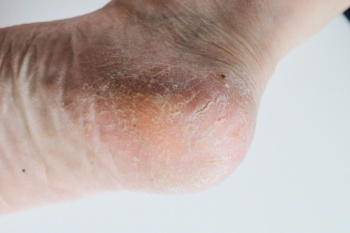
Cracked heels are a common foot issue that can be both uncomfortable and unsightly. Several factors contribute to this condition, including dry skin, prolonged standing, and exposure to harsh environmental conditions. Wearing open-back shoes can accelerate the problem by failing to provide adequate support. To prevent cracked heels, it is essential to keep the feet well-hydrated by using thick moisturizers regularly, especially after bathing. Wearing well-fitting, supportive footwear can reduce stress on the heels and prevent dryness. Additionally, exfoliating the feet weekly can help remove dead skin buildup, promoting healthier skin. Maintaining a balanced diet rich in vitamins and minerals also supports skin health. Cracked heels can be painful and unsightly, and may cause difficulty completing daily tasks. If you have this condition, it is suggested that you consult a podiatrist who can prescribe medication as part of a successful treatment plan.
Cracked heels are unsightly and can cause further damage to your shoes and feet. If you have any concerns, contact one of our podiatrists from Westland Foot & Ankle Specialists, P.C.. Our doctors can provide the care you need to keep you pain-free and on your feet.
Cracked Heels
Cracked heels appear unappealing and can make it harder for you walk around in sandals. Aside from looking unpleasant, cracked heels can also tear stockings, socks, and wear out your shoes. There are several methods to help restore a cracked heel and prevent further damage.
How Do You Get Them?
Dry skin is the number one culprit in creating cracked heels. Many athletes, walkers, joggers, and even swimmers suffer from cracked heels. Age and skin oil production play a role to getting cracked heels as well.
Promote Healing
Over the counter medicines can help, especially for those that need instant relief or who suffer from chronic dry feet.
Wear Socks – Wearing socks with medicated creams helps lock in moisture.
Moisturizers – Applying both day and night will help alleviate dryness which causes cracking.
Pumice Stones – These exfoliate and remove dead skin, which allows for smoother moisturizer application and better absorption into the skin.
Change in Diet
Eating healthy with a well-balanced diet will give the skin a fresh and radiant look. Your body responds to the kinds of food you ingest. Omega-3 fatty acids and zinc supplements can also revitalize skin tissue.
Most importantly, seek professional help if unsure how to proceed in treating cracked heels. A podiatrist will help you with any questions or information needed.
If you have any questions, please feel free to contact our office located in Westland, MI. . We offer the newest diagnostic and treatment technologies for all your foot care needs.
